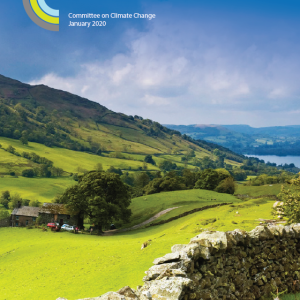
The UK’s Committee on Climate Change (CCC) has set out its policy recommendations on agriculture and land use, aiming to reduce the UK’s land-based emissions by 64% by 2050. The CCC estimates that its recommendations could produce £4 billion worth of benefits each year, including reduction of greenhouse gas emissions, recreational value of new woodland, better air quality and flood alleviation.
The key recommendations include:
- Increasing UK tree cover from 13% to at least 17% by 2050, to be achieved through tree planting
- Encouraging low-carbon farming practices, such as better manure management and controlled-release fertilisers
- Restoring at least 50% of upland peat and 25% of lowland peat
- Encouraging bioenergy crops
- Reducing food waste by 20%
- Reducing consumption of beef, lamb and dairy by at least 20% per person, in a shift towards current healthy eating guidelines.
The report distinguishes between long-lived carbon dioxide and short-lived methane (see p41 of the report), noting that the warming effect of methane depends on the sustained rate of emission, while the warming effect of carbon dioxide increases with each additional tonne released. For more detail, see the FCRN building block Agricultural methane and its role as a greenhouse gas.
Regarding grazing livestock, the report notes that while livestock on grasslands can be beneficial for soil quality, grassland is limited in the amount of carbon it can store in its soil (compared to converting grassland to forest), and thus cannot continually offset methane emissions from livestock (see box 5.2, p109). See the FCRN report Grazed and Confused?
View media coverage here:
- BusinessGreen: Less meat, more trees: UK climate advisors urge overhaul of 'unsustainable' farmland management
- Telegraph: Climate change advisers call for steeper air travel tax to reforest country
- Guardian: Make big polluters pay for mass tree planting, officials say
- Sky News: Radical changes 'needed in farmland use for UK to become carbon neutral by 2050'
- BBC: Cut meat and dairy intake 'by a fifth', report urges
Minette Batters, president of the UK’s National Farmers’ Union, said (source) “65% of British land is only suitable for grazing livestock and we have the right climate to produce high quality red meat and dairy. Therefore it makes sense that, when talking about environmental impact, as the report suggests, the public continues to support British livestock production.”
The UK’s Agriculture and Horticulture Development Board said (source) “Reducing meat and dairy intake by 20 per cent as suggested, means diets need to be supplemented with other proteins. Plant-based alternatives are not always sustainable when they are looked in the round for the environment. This is particularly true when water and biodiversity losses are fully quantified and managed.” For an exploration of the overall impacts of vegan diets and environmental tradeoffs associated with certain plant-based ingredients, see the FCRN blog Are modern plant-based diets and foods actually sustainable?
Dan Crossley of the Food Ethics Council said (source) “This is a mixed bag. How we use land is critical and moves to increase tree planting, restore peatland and cut food waste are welcome. However some proposals go no way far enough. For example, we need to slash food waste by much more than 20%. And pushing for more bioenergy crops is deeply controversial. We must take urgent action to tackle the climate and nature crises. We are all emergency respondents now.”
Environmental George Monbiot said (source) the report “...is a pathetic damp squib of a document, hopelessly unmatched to the scale of our climate and ecological emergencies. [...] neither rewilding nor regeneration are even mentioned. It talks only of tree *planting*, which is generally a slower, more expensive and less effective way of restoring habitats and drawing down carbon, and spreads plastic, and often disease, across the countryside.”
The Eating Better alliance said (source) “We have urged the Climate Change Committee to adopt the target of a 50% reduction in meat and dairy consumption in the UK by 2030, and for a transition to ‘better’ meat and dairy as standard. We recommend that the scenarios should be reopened to bring a renewed focus on biodiversity. For example a switch to chicken fed on imported feed and further intensification of agriculture will have serious impacts on climate, nature and health.”
Read the full report, Land Use: Policies for a Net Zero UK, here. See also the Foodsource building block What is land use and land use change?












Post a new comment »